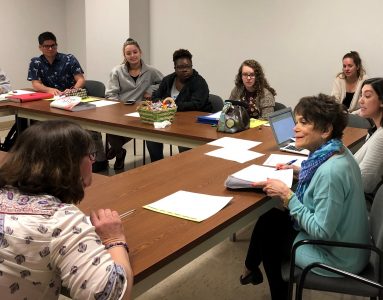KU professor retires after decades of helping young people stay in school, advocating for people with disabilities

photo by: Contributed photo
Jan Sheldon, right in light blue, leads a class of interns working for the Truancy Prevention and Diversion Program in April 2019. The classes allowed Sheldon to assign cases to the interns and review active truancy cases in Douglas County.
After more than four decades of helping young people stay in school, advocating for people with disabilities and inspiring her colleagues, University of Kansas professor Jan Sheldon is hanging up her hat.
Sheldon, a professor of applied behavioral science, retired last week. During her more than 40 years at KU, she spearheaded several initiatives to help young people and people with disabilities in the community, including the Truancy Prevention and Diversion Program, a joint program of Douglas County Youth Services and KU’s Department of Applied Behavioral Science that aims to help young people in the criminal justice system stay in school.
“We have worked with hundreds of children and youth over the years, and, hopefully, made a difference in their lives,” Sheldon said in an email.
Sheldon said the Truancy Prevention and Diversion Program grew from an idea by former Juvenile Court Judge Mike Elwell, who in 1977 noticed many of the young people who appeared in his court had dropped out of school. To address that issue, he asked for volunteers to help them stay in school. But the program didn’t have a formal relationship with KU until 1979, when Sheldon joined the effort after several of her students volunteered for the program.

photo by: Contributed photo
Jan Sheldon
Today, the program has help from about 20 KU graduate students, and it serves about 75 to 100 young people each year. According to Douglas County’s website, the KU students act as mentors and positive role models for the young people the program serves, and they meet regularly with the young people, parents and school staff, monitoring attendance and providing counseling.
Pam Weigand, Douglas County’s director of criminal justice services, said she has worked with Sheldon on the program for years and believes the program has helped prevent many young people from slipping into the “deep end” of the criminal justice system.
“She’s just had an incredible impact on the young lives in Douglas County, helping kids get re-engaged in school,” Weigand said. “She’s done amazing work. It’s not every professor at KU who makes a huge impact on the community, and she’s been dedicated to it for a long time.”
But that’s not all Sheldon did during her time at KU. She also founded Community Living Opportunities, an organization that supports children and adults with intellectual or developmental disabilities, and she served as the director of the university’s Edna A. Hill Child Development Center, according to the university’s website. In addition, she was inducted into the KU Women’s Hall of Fame in 2017.
Sheldon said she chose to retire partly to help take care of her husband, who was diagnosed with a neurological syndrome that affects his ability to communicate. She said she also plans to spend more time with her three grandchildren, two of whom live across the street from her in Lawrence.
“I get to see the two who are here in town every day, and they are the light of my life,” she said. “I am very lucky to have them.”
Sheldon, who is originally from Independence, not only worked for the university, but studied there as well. She earned bachelor’s and master’s degrees in human development and family life, a doctorate in developmental child psychology and a law degree from KU.
Florence DiGennaro Reed, an associate professor and chair for KU’s Department of Applied Behavioral Science, said she’s known Sheldon since joining the department’s faculty in 2010. She said she noticed Sheldon’s professionalism, poise and success as a professor right away and asked Sheldon to be her mentor.
“She was a wonderful resource for me both professionally and personally,” DiGennaro Reed said. “It was evident that she cared deeply about the quality of the educational opportunities provided to undergraduate and graduate students and worked hard to help the department fulfill its mission.”
DiGennaro Reed also said Sheldon went about her work without much “fanfare,” including her work advocating for individuals with intellectual and developmental disabilities.
“The department and university community have benefited greatly from Dr. Sheldon’s passionate and tireless work,” DiGennaro Reed said. “I will miss her very much, and her absence will be felt. I know departmental faculty feel the same.”
Contact Dylan Lysen
Have a story idea, news or information to share? Contact reporter Dylan Lysen:
- • dlysen@ljworld.com
- • 785-832-6353
- • Twitter: @DylanLysen
- • Read other stories by Dylan







